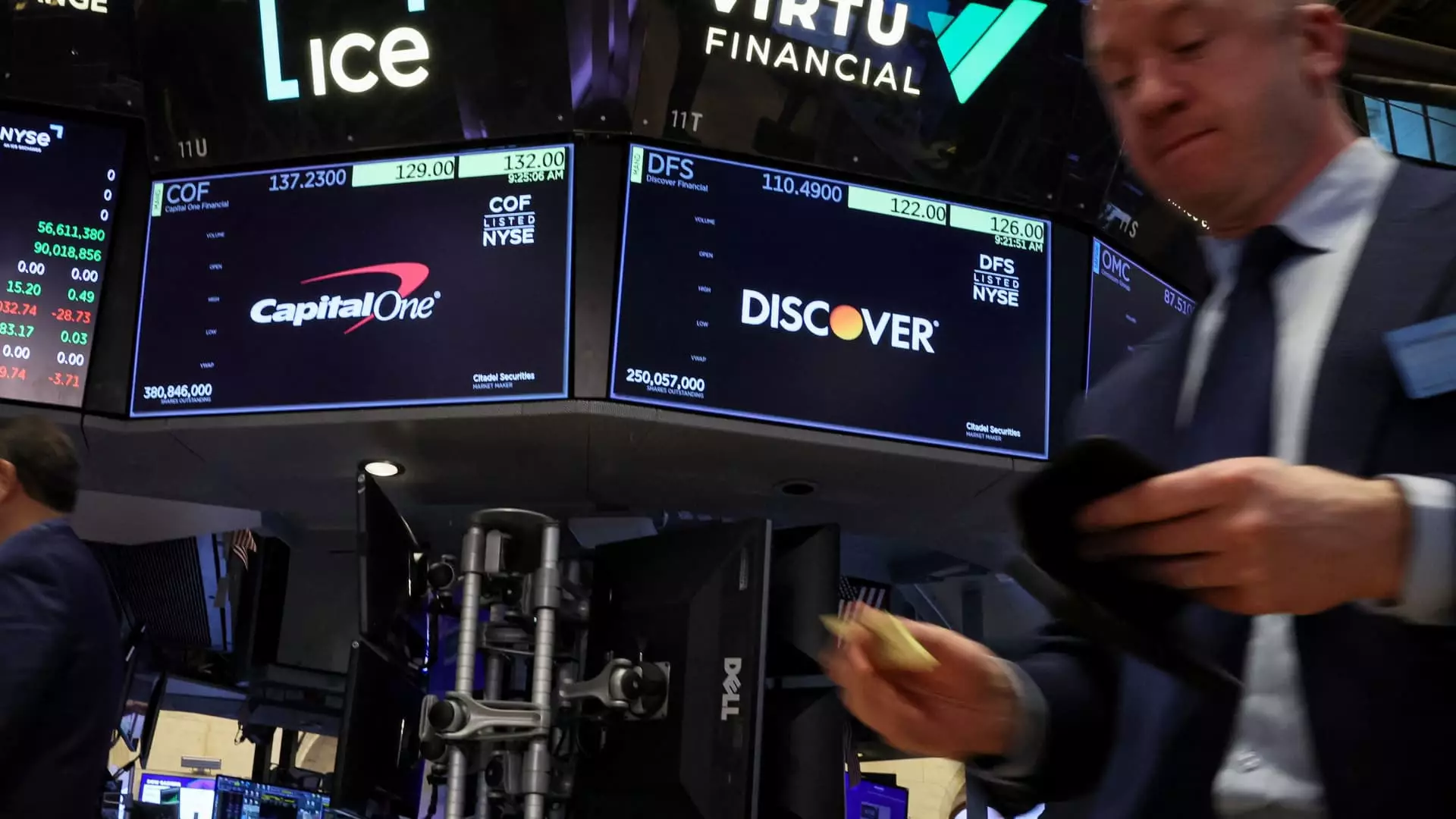In the fast-paced world of finance, where markets shift as swiftly as the tides, the recent buzz surrounding Capital One is nothing short of electrifying. Analysts at BTIG have set an ambitious target, suggesting that if Capital One’s merger with Discover Financial Services hits its stride, the stock could skyrocket to an astonishing $427 per share. This figure represents a jaw-dropping increase of more than 137% from its closing value just last Monday. Yet, the optimism surrounding this merger isn’t merely a product of market hysteria; it reflects a calculated assessment of potential earnings growth and market positioning.
The analysts posit that Capital One stands to harness Discover’s network to significantly bolster its competitiveness in the premium credit card sector. They characterize Discover’s existing payment framework as an “unpolished diamond,” suggesting that with the right technological enhancements and strategic direction, particularly from Capital One, it could shine brighter amidst the titans of the industry like Visa and Mastercard. This perspective elevates the dialogue from speculation to informed forecasting, hinting at the transformative capacity the merger could yield for Capital One.
Capital One’s Resilience Amid Regulatory Scrutiny
Adding another layer of intrigue to this narrative is the backdrop of regulatory scrutiny facing the merger. Reports emerged indicating that the Department of Justice, emphasizing concerns about market concentration in the subprime credit card segment, could pose hurdles to the deal’s approval. Yet, in the face of this turbulence, Capital One remains steadfast. A spokesperson for the firm has expressed confidence that the deal meets all legal prerequisites, underscoring a proactive approach to regulatory challenges.
BTIG’s recommendation extends a lifeline even on the assumption that the merger falters, placing a standalone price target of $208 per share on Capital One. This indicates a respectable upside of approximately 15%. The rationale behind such optimism isn’t solely hinged on the merger; it is also rooted in the capital accumulation strategy that Capital One has executed since the announcement of the merger in February 2024. This has allowed them to potentially embark on a buyback of $25 billion worth of stock over the next three years, thus boosting earnings per share dramatically. Capital One’s foresight in tightening its underwriting standards—while not impervious to a shifting consumer landscape—positions the company advantageously against competitors like American Express and Ally Financial.
Market Reactions and Institutional Support
Despite initial tremors in the market following the DOJ’s rumblings, Capital One’s stock has shown resilience, reflecting a near 1% increase on a recent Tuesday. It is noteworthy that this rebound occurs in a broader market context where financial sector stocks frequently experience volatility. The undercurrent of institutional support for Capital One indicates a collective belief in the company’s strategic direction. Analysts from multiple firms, including Citi, KBW, and Jefferies, have circled the wagons around the stock, emphasizing their expectation that the merger will eventually procure regulatory approval.
The aftermath of this optimism portrays Capital One as a stock to watch, not just for its potential short-term gains, but for its ability to adapt and thrive in a changing regulatory landscape. The pending acquisition appears to be a driving force behind increased investor interest, with retail and institutional investors alike considering it a prospective gold mine if managed prudently.
Broader Implications and Future Outlook
The implications of the Capital One-Discover merger—and its potential rejection—extend beyond mere stock price fluctuations. It encapsulates critical themes in the contemporary financial ecosystem, namely competition, consumer protection, and regulatory oversight. Should the merger succeed, it might compel other entities within the sector to recalibrate their own strategies, creating a renewed focus on innovation and customer experience. Conversely, a failed merger could lead to a chilling effect on future consolidation efforts within the financial services sector.
What also stands out in this evolving narrative is the tenacity of Capital One’s leadership, particularly CEO Richard Fairbank, who is likely to explore all avenues to placate regulators amid antitrust concerns. There’s speculation that divesting Discover’s subprime portfolio could be one such compromise, a move that could potentially satisfy regulatory entities while still allowing the core merger benefits to flourish.
The financial world is often unpredictable, but the prevailing sentiment surrounding Capital One suggests an exciting trajectory lies ahead—filled with risk, opportunity, and potential transformation. The bullish outlook shared by analysts offers a glimmer of hope for investors as they navigate this complex landscape, where the stakes are undeniably high and the rewards, potentially life-changing.

